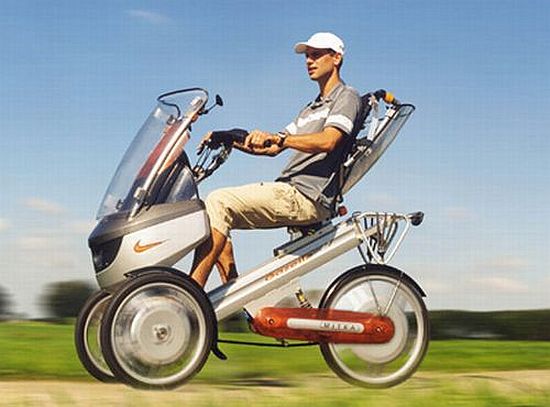New Mars Forums
You are not logged in.
- Topics: Active | Unanswered
Announcement
#101 2019-11-26 20:42:00
- SpaceNut
- Administrator
- From: New Hampshire
- Registered: 2004-07-22
- Posts: 30,594
Re: Quadracycles
Something for the hybrid aspects of powering a vehicles movement
https://auto.howstuffworks.com/fuel-eff … r-cars.htm
They making of a solar toy might not seem to relate but the parts and process for any do it yourselfer.
equations for drag
I tried using my http://enginuitysystems.com/EVCalculator.htm for a 4000 lb (1818 KG) vehicle, and for 0 acceleration I get 504 Newtons (113 lb force) of thrust at 100 kM/h (62 MPH), and 356 Newtons (80 lb force - rolling resistance) at 0 MPH (after fixing my formula):
Code:
fForce = (fMass*fGrav*fRoll) + ((fAir*fDrag*fArea*(fSpeed/3.6)^2)/2) + (fMass*fAccel);
fPower = fForce*fSpeed/3.6;
The power required seems to be about right, with 5.46 kW at 31 MPH and 18.8 kW at 62 MPH, so it is somewhat a square law function related to speed.But the most force will be from the acceleration (or incline), which is 4901 Newtons (1100 lb force) for a 25% grade or 2.5 m/sec/sec acceleration.
I think I see the error in my formula - a misplaced parenthesis - since the sum of all the speed terms should be squared. :confused:
Bottom line, however, seems to be in favor of keeping the transmission and 4WD and using a smaller motor.
[edit] I found some references for estimations of power and force for vehicles:
http://craig.backfire.ca/pages/autos/drag
http://www.engr.colostate.edu/~allan/fl … page8.htmlThe second document shows the following formula:
F = Cr*m*g + 0.5*p*Cd*A*V^2
Where g = gravity constant (9.8), Cr = Coefficient of rolling resistance (0.015 typ), p = Density of air (1.2), and Cd = Coefficient of drag (0.3 typ)
Online
Like button can go here
#102 2020-01-17 21:17:37
- SpaceNut
- Administrator
- From: New Hampshire
- Registered: 2004-07-22
- Posts: 30,594
Re: Quadracycles
Pedaling is a low rpm that is for a large diameter pulley down to the small pulley that connects to the alternator. This make the rpm step up and while the size ration for the input that we give for pedaling is easy we still can get quite a few watts from doing so.
Retrofitting a Car Alternator for Low-Speed Power Generation
Lots of good design stuff in the document. Data table for input to field coil circuit to the voltage that it can generate. The standard coil windings for the output coils are setup as a 3 phase spreading out of them around the stator air gap shell. The core finger are used to turn the coil field into alternating magnetic fields for the motion of the shaft to create ac in the stator coils. If you can get the unit appart you can rewire the coils to create the design that you want.
Online
Like button can go here
#103 2020-01-17 21:57:32
- SpaceNut
- Administrator
- From: New Hampshire
- Registered: 2004-07-22
- Posts: 30,594
Re: Quadracycles
This company makes AC k watt output products
https://www.whisperpower.com/US/4/7/pro … stems.html
https://www.mastervolt.com/all-you-need … egulators/
https://res.mdpi.com/d_attachment/energ … -00274.pdf
Development of Automotive Permanent Magnet Alternator with Fully Controlled AC/DC Converter
Online
Like button can go here
#104 2020-01-26 16:51:14
- SpaceNut
- Administrator
- From: New Hampshire
- Registered: 2004-07-22
- Posts: 30,594
Re: Quadracycles
Repost of combination exercise to power information that might as well make use of that exercise energy to do something useful like in pumping water to compressing air or even making electricity.
So how much energy do we get depends on the person
power-potential-various-exercise-machines
POWER PRODUCTION
Lat Pulldown: 594W/612W
Leg press: 450W/360W
Low Row: 306W/270W
Chest Press: 270W/189W
Machine Fly: 234W/189W
Leg extension 207W/126W
Triceps extension 198W/234W
Shoulder press 135W/162WENERGY PRODUCTION
Lat Pulldown: 9,9Wh/10,2Wh
Leg press: 7,5Wh/6Wh
Low Row: 5,1Wh/4,5Wh
Chest Press: 4,5Wh/3,15Wh
Fly: 3,9Wh/3,15Wh
Leg extension 3,45Wh/2,1Wh
Triceps extension3,3Wh/3,9Wh
Shoulder press 2,25Wh/2,7WhENDURANCE TRAINING
Stair stepper: 150 watt = 50 Wh in 20 minutes.
Rowing machine: 122 watt = 40.6 Wh in 20 minutes.
Cycling machine: 110 watt = 36.6 Wh in 20 minutes.
Crossfit: 50 watt = 16,.7 Wh in 20 minutes.
Steps: 35 watt = 11.7 Wh in 20 minutes.
Here is the current direction of Human powered devices which use the car alternator to generate power which is a high rpm device that at the low rpm rate is not going to generate the power levels we desire for a human powered vehicle as we need to power life support equipment while idle and not in motion.
Here is a bit more for that exercise group schedule
https://www.lowimpact.org/human-power-generation/
The key is not just making the energy but being able to store it for later use. The lowimpact page has lots of stuff to go for more topics on the right side bar of other stories.
Online
Like button can go here
#105 2020-01-27 14:42:59
- SpaceNut
- Administrator
- From: New Hampshire
- Registered: 2004-07-22
- Posts: 30,594
Re: Quadracycles
The average human being is capable of producing sustained power of about 75 watts. So as a bulk power source, this is not a sensible idea. However, there are applications that require only small amounts of energy on an occasional basis. Often, the cost of providing this small amount of power using batteries and grid charging connections is a high proportion of lifetime cost. In those situations, human power is a good idea.
The simplicity of a human powered bicycle, makes it much more affordable than an electric scooter. A gravity powered light, is a self contained device, which will last centuries without wearing out. A torch can be charged by the movement of a human carrying it in his pocket. A sewing machine can be peddle powered, etc. There are many applications where small amounts of power can be provided by humans, eliminating a lot of complexity. The brace is a human powered drill. It is a much simpler device than an electric powered drill and much easier to make.
https://en.wikipedia.org/wiki/Brace_%28tool%29
Calliban,
Human powered vehicles would be even more effective if they were recumbent and had electric assist for hill climbing and acceleration. I think a reasonably fit adult should be able to maintain 20 mph quite easily with one? For getting around a town, that would be plenty. The biggest problem would be motor vehicles causing a safety risk, but if there's a shortage of oil that problem will disappear. Make them easy to store, rebuild our railway network, and we're good.
Online
Like button can go here
#106 2020-01-27 14:48:21
- SpaceNut
- Administrator
- From: New Hampshire
- Registered: 2004-07-22
- Posts: 30,594
Re: Quadracycles
But that power level is with alternators and not a permanent magnet low rpm generator design both of which are not what you have in an alternator designed piece of equipment. As the alternator needs high rpm in excess of 1,000 to 3,000 revolutions and requires the battery field connection to make the magnetic field for motion to be turned into an output voltage and current from the alternator.
Low speed rpm generators are under that 500 rpm
https://www.houghton.edu/wp-content/upl … erriam.pdf
https://www.hindawi.com/journals/isrn/2012/489379/
All of this must fit onto a frame of sorts.

http://www.schultzengineering.us/bchap6.html
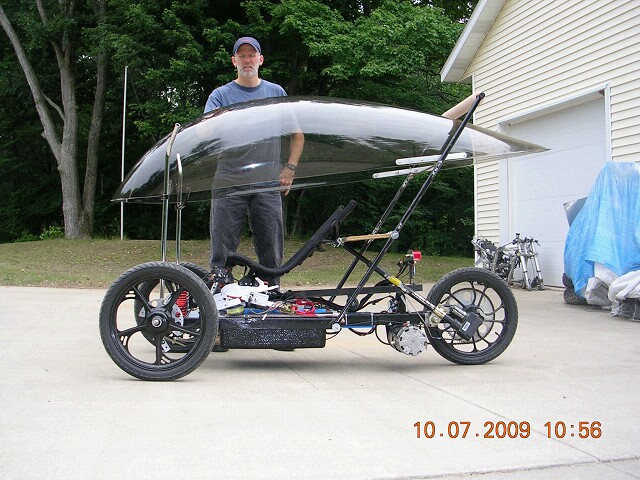
Online
Like button can go here
#107 2020-02-02 22:26:52
- SpaceNut
- Administrator
- From: New Hampshire
- Registered: 2004-07-22
- Posts: 30,594
Re: Quadracycles
This is a low rpm product
http://www.pmgenerators.com/products/wi … lternator/
torque is the force needed to make the shaft move.
english we usually said that its foot pounds but what I saw was the labels reversed.
1 Lb-Ft = 1.35582 Nm.
not all of the low rpm are so hard to make move
The brushless permanet magnet designs can be found in motors that when wiring is changed for the coils can be made into a dc generator
The units for wind power are also low rpm mostly and much easier to turn.
This one has the sprocket gear on the shaft for use with bike chain pedaling drive
http://www.greenergystar.com/shop/wind- … ller2.html
The coils on this one can be used for a washing machine motor or for a wind generator
https://windgenkits.com/
spec page 1
Spec page 2
Online
Like button can go here
#108 2020-02-16 15:49:27
- SpaceNut
- Administrator
- From: New Hampshire
- Registered: 2004-07-22
- Posts: 30,594
Re: Quadracycles
repost
Engineering Explained - The Truth About Electric Cars Biggest Problem
As he explains in the video, passenger cars moving at highway speed are near the limit of what a battery can practically power before you start carrying entire extra passengers in the vehicle, in terms of battery weight, to increase range beyond what we're currently limited to. Each 60 miles you wish to carry in a battery electric vehicle at 65mph represents an additional 140 pounds of mass. The increase is also linear since the vehicle never becomes any lighter as the battery packs are depleted. The video also explains why going just a little faster (65mph vs 75mph) and having just a little worse drag coefficient effectively doubles the energy requirement, to the point of making electric trucks impractically heavy or reducing useful load to impractical levels unless new roads with the capacity to support greater vehicle mass are built.
https://www.ebikes.ca/learn/pedal-assist.html
https://www.electricbike.com/the-twike-challenge/
https://newatlas.com/rungu-electric-jug … mdv/55294/
https://visforvoltage.org/forum-topic/b … -quadcycle

Online
Like button can go here
#109 2020-02-16 16:51:36
- kbd512
- Administrator
- Registered: 2015-01-02
- Posts: 8,516
Re: Quadracycles
SpaceNut,
As I noted in the thread that re-post was pulled from, Mars offers distinct advantages to battery powered vehicles not available on Earth, namely lower gravity and near-zero aerodynamic drag losses.
Offline
Like button can go here
#110 2020-02-16 18:41:19
- SpaceNut
- Administrator
- From: New Hampshire
- Registered: 2004-07-22
- Posts: 30,594
Re: Quadracycles
As you noted that road conditions for mars would create a higher energy level when compared to the other side where the benefits of low gravity for mass and air restence drag on the other aspects would change the dynamic of a vehicle for mars that is wheeled for sure. but for tracks I think we gain the roughness energy expendature back as they tracks would tend to roll a bit better.
For the lithium battery pack we have several times where we must monitor the temperature of the assembly such that we do not destroy it. When in use or discharge, when idle from the mars cold and when recharging with fast not being the best practice so as to make battery life longer.
https://www.digikey.com/en/articles/tec … y-charging
The charging profile is part of the chemistry of the battery.
https://batteryuniversity.com/learn/art … _batteries
here is how to prolong the battery capability
https://batteryuniversity.com/learn/art … _batteries
https://www.digikey.com/en/resources/on … alculators
contains a calculator for many things including batteries
Just adding in another page for what can be used..
http://99mpg.com/categories/ima/
Honda Insight IMA motor used as a pedal generator but its not been rewired for low rpm so while the power output is better than a car alternator its still not that high at 600 watts.
Here is another pedal powered vehicle
Kia electric-assist pedal car would be dispersed like a SEED
Known as the SEED Car, the four-wheel-drive vehicle is pedalled by its driver, with a motor providing "a high degree of electric power assistance to make it effortless." Although very little else was available in the way of specs, it is claimed to have an electric-assist range of 100 km (62 miles)..

Online
Like button can go here
#111 2020-03-28 11:04:58
- SpaceNut
- Administrator
- From: New Hampshire
- Registered: 2004-07-22
- Posts: 30,594
Re: Quadracycles
Was reminded of this topics general content of Pod Car or in this case a hybrid there in which can use human powered pedaling and electrical stored energy for a motor. 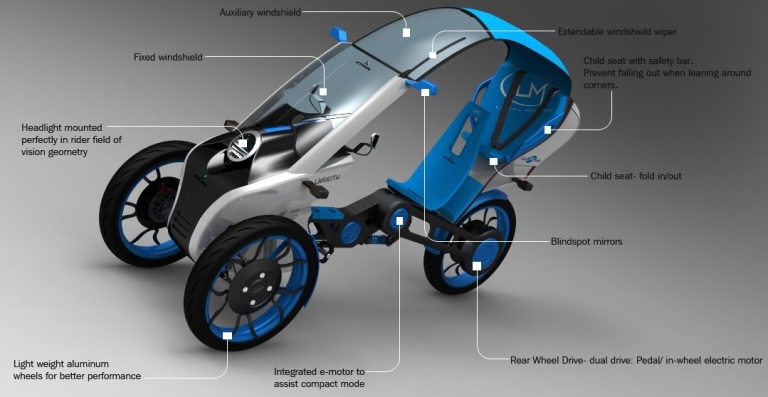
This one has a full shell for the weather
https://commons.wikimedia.org/wiki/File:Cree_SAM.jpg
http://www.bbc.com/autos/story/20160907 … motor-city
https://ibikes.wordpress.com/2018/11/01/itrike/
https://www.goldenmotor.com/eMotorcycle … emotor.htm
Online
Like button can go here
#112 2020-03-28 12:08:50
- SpaceNut
- Administrator
- From: New Hampshire
- Registered: 2004-07-22
- Posts: 30,594
Re: Quadracycles
No direct chain or belt drive just Pedal powered generator ev pod car inside view.
http://eiproject.net/elf-3-wheel-pedal-solar-powered/
https://organictransit.com/information-about-the-elf/

Online
Like button can go here
#113 2020-03-29 17:23:16
- SpaceNut
- Administrator
- From: New Hampshire
- Registered: 2004-07-22
- Posts: 30,594
Re: Quadracycles
Found a pod car document for design of the vehicle numbers
https://www.podbike.com/downloads/Full-10.pdf
Showing the motor type and generator to be used concepts.
Here is a 3 wheeled vehicle that is called a tweek
Twike vehicles are human electric hybrid vehicles built for 2 people and their cargo. The vehicles are surprisingly lightweight as they constructed of primarily plastic and aluminum components. These innovative half-ton vehicles can be powered by a 3.3 kw ni-cad battery or a 6kw nickel metal hydride one along with a 3 kilowatt electric motor Twike Electric Carswhich runs the drive train. Twike`s are easily recharged in no longer than 3 hours by plugging into a common 230V household outlet. Their energy drive is further supplemented by the regenerative braking system and the pedal system lightens the power load even more.
They are equipped with aTwike Electric Carsjoystick which makes steering fairly simple and they can reach respectable top speeds of nearly 55 mph. Depending on which type of battery is used, a TWIKE can journey 55-90 miles on a single charge. This range varies based on the weight of the passengers and cargo as well. Battery and power control is managed by an onboard computer which regulates energy use. After market modifications can be made to this system and some users have been able to attain reported top speeds of 65 mph.
While they are around $6,000 for a new unit which is expensive only when you buy it but it’s an electric car that uses up no more than 8 kWh/100 km and the usual gasoline cars burn more than 33 kWh/100 km! Currently the gaoline prices are falling and are near $2.00 for the gallon but will it last?
shell shape from startrek
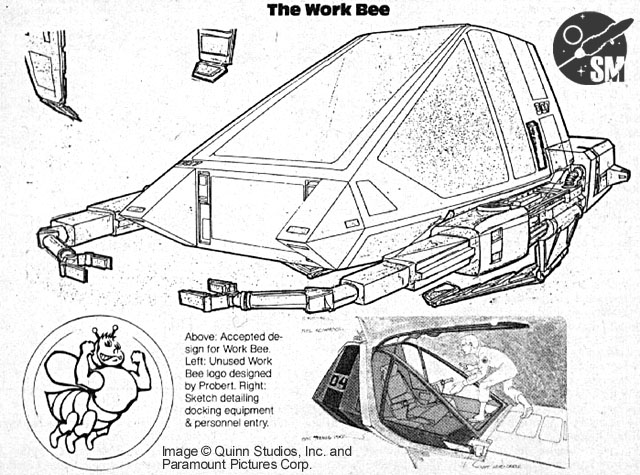
Online
Like button can go here
#114 2020-03-29 19:07:38
- SpaceNut
- Administrator
- From: New Hampshire
- Registered: 2004-07-22
- Posts: 30,594
Re: Quadracycles
As much as we enjoy our motorized vehicles we also have grown accustomed to power assisted technologies of steering and braking within them as hydraulic systems. For the pedal power at speed we are going to need a power assisted braking or hybrid for how to male standard systems work.
The stops to use much of the posts in this for other applications may not be all that clear but anything that uses batteries, motors, sensors ect all apply to other applications such as in telerobotics.
edit to add links to
The Washing Machine Motor Project
The particular motor can also be a generator and works at low rpm's. Its used in home grown windmills as well.

Windmill Generator using a Fisher and Paykel washing machine motors
Was looking to build a vehicle with 4 of these to charge batteries after a bit of rewiring for voltage to rpm such that we use 3 of the to make a 3 phase motor power system and the 4th to run all of the electronics, heat and other things that we need in the vehicle.
It is possible to create 48v 1000watt Wind Turbine
https://www.bergtoys.com/us/pedal-karts/e-bf
https://www.ecowatch.com/german-bike-ca … 88045.html
Online
Like button can go here
#115 2020-08-24 17:47:30
- SpaceNut
- Administrator
- From: New Hampshire
- Registered: 2004-07-22
- Posts: 30,594
Re: Quadracycles
Sparked by the fact that I am with out an auto mobile once again....
Frame construction of a 3 wheeled vehicle frame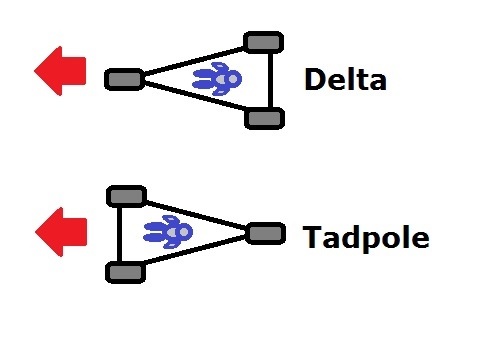
Other good bike websites I use:
http://www.sheldonbrown.com/
http://www.recumbents.com/home/
http://www.ihpva.org/Projects/Practical … 3%20design
http://www.bentrideronline.com/index.php
Bamboo resources I found invaluable:
https://www.instructables.com/id/Carbon-Fiber-Bike/
https://www.instructables.com/id/How-to … o-Bicycle/
https://www.instructables.com/id/How-I- … and-a-bam/
https://www.instructables.com/id/Bamboo-Bike-2/
https://www.instructables.com/id/Bamboo … Road-Bike/
http://bamboobike.wordpress.com/
https://plus.google.com/photos/11700294 … banner=pwa
http://build-its.blogspot.com/2010/09/b … frame.html
While the Fat boy tires are a good feature I am, not sure about the dual-stick steering
https://unclewiener.com/product/new-dev … ike-tad01/
Sure would like it with dual front hub drive tires
Side view showing chain
This has pictures for the DYI
https://www.atomiczombie.com/streetfox- … -diy-plan/
Online
Like button can go here
#116 2020-09-15 17:25:24
- SpaceNut
- Administrator
- From: New Hampshire
- Registered: 2004-07-22
- Posts: 30,594
Re: Quadracycles
Just saw a TV commercial and just had to google for it
Sure its not pedal powered but it is human energized still
Shocked that I had not seen this before and its from 2010....
What I think could happen is an enclosed a vehicle that allows for exercise and movement to a desired location. One could alter the direct drive and make it move a generator to make the new vehicle a hybrid ….
This image showed up with the others
Online
Like button can go here
#117 2020-09-16 18:08:24
- SpaceNut
- Administrator
- From: New Hampshire
- Registered: 2004-07-22
- Posts: 30,594
Re: Quadracycles
On Earth, velomobiles are just about the most efficient personal transport options known to man.
https://www.lowtechmagazine.com/velomobiles/On Mars, without air resistance, these things don't need to be streamlined and there is more freedom in how they look. The cabin is most useful for keeping air in rather than optimising against air resistance.
An electric drive system would work best. The passenger would pedal generating electricity,mwhich would power drive motors.
Online
Like button can go here
#118 2020-09-16 18:09:09
- SpaceNut
- Administrator
- From: New Hampshire
- Registered: 2004-07-22
- Posts: 30,594
Re: Quadracycles
For Calliban re #148 Thanks for the reminder of the velomobile. I like your suggestion of the hull/cabin holding atmosphere for the operator.
A location where such a vehicle would seem especially useful is tunnels between habitats on Mars ... The tunnels themselves could be maintained at Mars ambient pressure and temperature, with just a bit of lighting provided by solar panels on the surface.
The advantage I see in this concept is that the vehicles would be entered/loaded in a "garage/airlock" at Mars standard habitat pressure, sealed up, and then the door would open to allow exit to the tunnel. The operator could move along the tunnel at a respectable speed, generating a light ahead to see the path better, and running lights for visibility by other traffic in the tunnel.
Upon arrival at the destination habitat, the operator would radio a request for the garage/airlock to open, the door at the destination would open, and the operator would drive inside. The door could be closed and the airlock represurized to Mars standard habitat pressure, at which point the operator would unlock the seals and exit the vehicle.
SpaceNut ... this recent discussion fits into the collection already created in the forum, in case future readers might wish to explore the full collection.
(th)
http://www.wisil.recumbents.com/wisil/P … mliner.htm
tie size and rpm equals how fast?
https://endless-sphere.com/forums/viewtopic.php?t=16114
Online
Like button can go here
#119 2020-09-16 18:10:43
- SpaceNut
- Administrator
- From: New Hampshire
- Registered: 2004-07-22
- Posts: 30,594
Re: Quadracycles
SpaceNut wrote:tahanson43206 wrote:I was trying to describe an enclosed cabin, within which a human could operate a mechanical drive mechanism in case the primary electrical drive system failed.
This would have been a great place to have inserted an image, so I'll try to remember that in future.
My first idea was a thin walled aluminum shell, but (upon reflection) I now think that a transparent plastic bubble would enclose useful atmosphere around the operator, and provide unlimited visibility. A risk for the operator of such a vehicle would be unwanted influence of Martian winds, although I suppose a tail wind would be useful if it could be managed.
Will this do?
https://tse1.mm.bing.net/th?id=OIP.W6i4 … d=3.1&rm=2
Internal lighting would be by LED since they are low in power use.
Cool picture. I think it is fair to conclude that a Mars bike would look very different to an Earth bike. I am intrigued by the idea of long range human powered journeys on Mars. Kind of like camping expeditions on a bike. With only 38% of Earth gravity, there are more options on Mars than on Earth, as a cyclist could carry more.
Air resistance on Mars is practically irrelevant, so frontal area does not matter, especially at the low speeds typical of biking, I.e 10-30mph. So the bike seating will be designed to allow the most effective posture for sustained human leg work. Lower air resistance also allows tolerance of greater weight.
However, weight is always an issue. A spherical vessel is the most mass efficient option in terms of mass per unit enclosed volume. It provides additional volume for things like oxygen, water, food, reclining seats, sleeping bag, etc. The average human under fairly sedentary conditions, will consume about 10MJ of food energy per day, requiring 0.76kg of oxygen. Under heavy work conditions, that might actually double, I.e 1.5kg oxygen per day. Producing this much oxygen through electrolysis of water would require about 25MJ of electricity. About 10m2 of flexible solar panels, weighing about 10kg, could be rolled out for 4 hours a day around noon time, to electrolyse enough water for breathing.
At night, the biker would wrap up warm in the sleeping bag, as temperatures in the cabin would drop far below zero. An aerogel blanket extended over the vehicle would minimise heat loss.
Online
Like button can go here
#120 2020-10-10 13:43:40
- SpaceNut
- Administrator
- From: New Hampshire
- Registered: 2004-07-22
- Posts: 30,594
Re: Quadracycles
http://www.recumbents.com/wisil/whatsup.htm
Edit adding human pedal power rating
https://www.cyclinganalytics.com/blog/2 … ut-compare
http://americanroadcycling.org/articles … sSpeed.htm
Cadence rpm
https://en.m.wikipedia.org/wiki/Cadence_(cycling)
http://www.soltechdesigns.com/windslope/
Continuing to add on the City"Q"
https://youtu.be/d5nV1vkSMp0
Online
Like button can go here
#121 2020-10-10 15:07:21
- tahanson43206
- Moderator
- Registered: 2018-04-27
- Posts: 24,116
Re: Quadracycles
For SpaceNut re #120
That's an impressive web site!
The layout reminds me (a bit) of the collection of links you showed us recently, in response to an observation by GW Johnson.
(th)
Offline
Like button can go here
#122 2020-11-20 10:28:32
- SpaceNut
- Administrator
- From: New Hampshire
- Registered: 2004-07-22
- Posts: 30,594
Re: Quadracycles
Coming up with a universal platform to build with is where This modular EV vehicle platform can shift into endless types of vehicles from trucks to tiny delivery vehicles
It looks low to the ground which is a problem for everyday use where it snows.
Thi one would be ideal for turning into a pedal powered vehicle
REE Automotive is developing electric vehicle platforms that can turn into cargo delivery trucks, passenger shuttles, and more.
Unlike most major automakers looking to build fully fledged electric vehicles, REE is taking the business approach of creating multi-sized electric vehicle platforms, an idea that other makers like Daimler, Volkswagen, General Motors, startup Karma Automotive, and even the German Aerospace Center have started exploring as well.
EV battery basics: All you need to know about kW, kWh, and charging speed

When you add a motor to a vehicle that does not start with one you are going to need a motor controller.
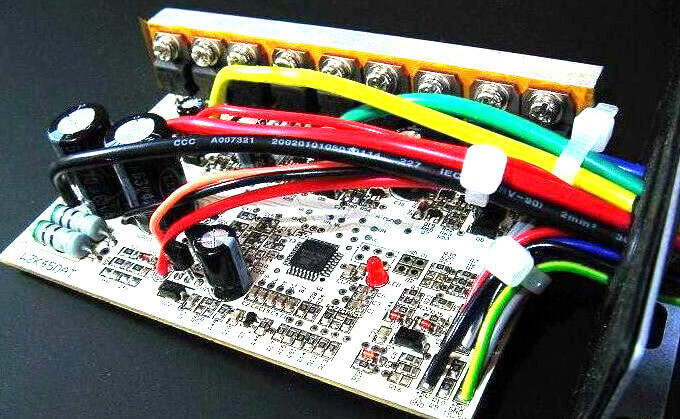
with it tying into the equipment sort of like this.
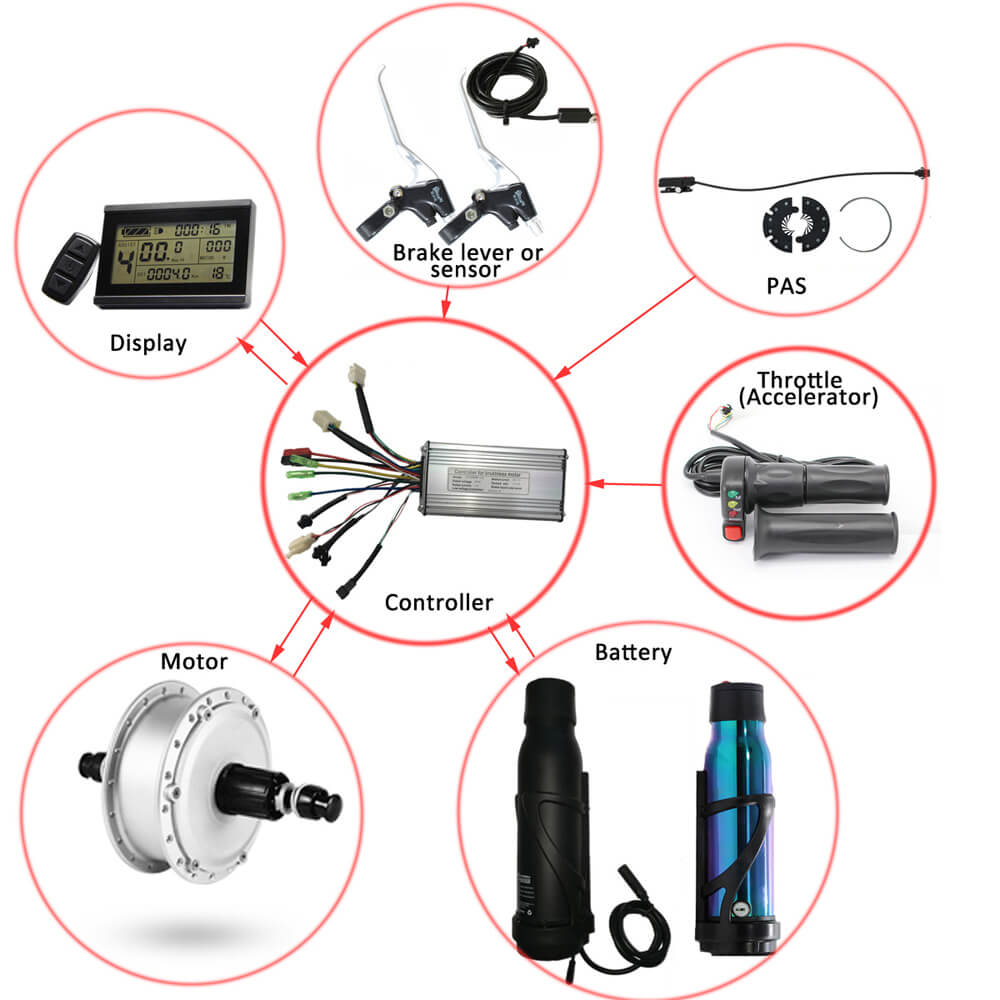
Online
Like button can go here
#123 2021-01-17 19:51:39
- SpaceNut
- Administrator
- From: New Hampshire
- Registered: 2004-07-22
- Posts: 30,594
Re: Quadracycles
A bike is just half of a quadracycle but the resources for it to go fast dal power is a means to making a vehicle affordable for those which can not keep a petrol vehicle running
https://www.instructables.com/50-Mph-E-Bike/
Nice battery chart with lots of details for the choice you can take to do the conversion.
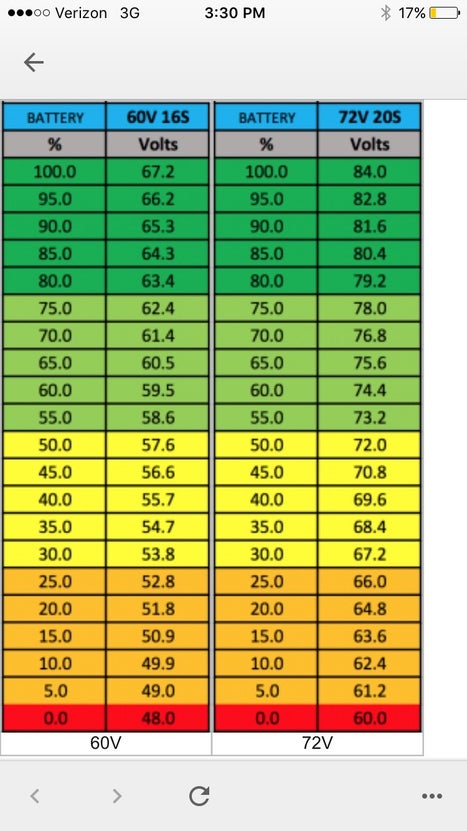
This is a pedal assist drive assembly
https://www.cycmotor.com/x1-stealth
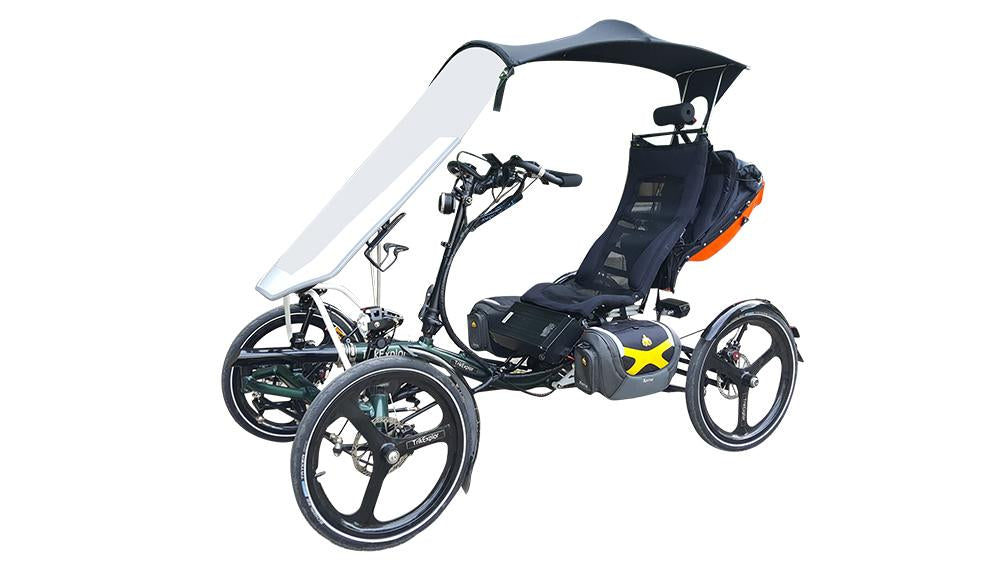
Online
Like button can go here
#124 2021-08-27 19:37:59
- SpaceNut
- Administrator
- From: New Hampshire
- Registered: 2004-07-22
- Posts: 30,594
Re: Quadracycles
Just adding in another interesting ev motor used to make motion for a bike of course we can alter the wheel count.
E-bike with washing machine motor does 68mph
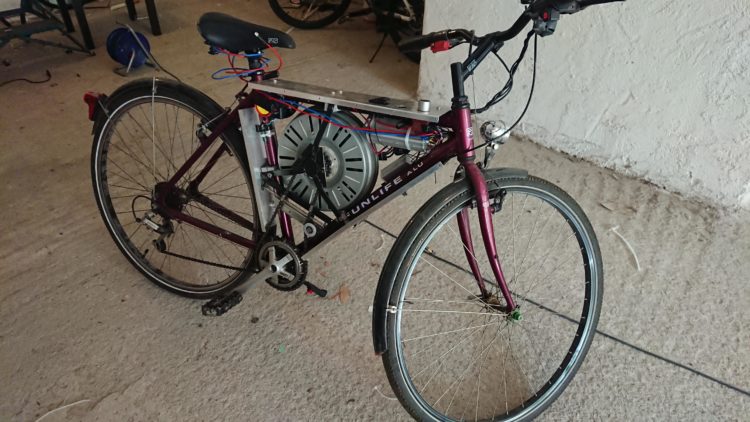
wow thats fast.
E-bike out of nowhere as he had a brushless DC motor laying around from an LG washing machine
The motor originally ran on 200 volts but because he doesn’t “want a top speed of 150km/h [93 mph]” and doesn’t “want to die anytime soon,” it now runs on 48 or 50 volts. That said, he did take the bike up to 110 kph (68 mph) to see if he could. Not surprisingly the incredible speed damaged his rims from braking and cooked his lead acid battery.
These are a permanent magnet motor with the hub holding the magnets and the coils are held stationary.
These also make it to a nice power generator with an means to spin the hub.
While the motor is a 3 phase design it is possible to change it to a single phase to make use of a single phase controller
https://www.amazon.com/24V-90V-Controll … B076KPP92X
of course motor wattage must be with in the controllers value as well.
Online
Like button can go here
#125 2021-08-30 07:38:56
- Calliban
- Member
- From: Northern England, UK
- Registered: 2019-08-18
- Posts: 4,305
Re: Quadracycles
In his book 'How to Live on Mars', Zubrin recommended the use of motor bikes for prospecting Mars. He recommended methanol-LOX direct methanol fuel cells as the power source. It makes a certain amount of sense keeping total mission mass to a minimum, if what you are gathering is information. A small inflatable tent could be deployed for sleeping, eating and end of day toilet. I have to say, the idea of setting off for days on a motorbike, wearing a space suit and a few tens of kg of supplies, on a planet where you cannot even breath the air, is not for the faint hearted. But maybe it does make logistical sense for genuine explorers. I would feel happier doing that if there were at least a few fuel depots, complete with oxygen, a radio and an emergency tent, that could be used as hubs.
Zubrin also recommended the use of motor less, hydrogen filled balloons, to lift explorers and their motor bikes and carry them around the planet on the Martian winds. One would get on at the base, ride the wind until arriving at a couple of hundred km of site of interest. Then, release enough hydrogen to descend to the ground, tether the balloon and use motor bikes to get to the site. Coming back, the bikers would stay their gear and bikes under the balloon and climb back into. Hydrogen would be released from a compressed cylinder. They would then ride the balloon as winds carried it around the planet, until it arrived close enough to the base to be in range of their bikes. At this point, the hydrogen would be released and the folded balloon stowed within a trailer. In this way, a motor bike and reusable hydrogen balloon can be used to explore most of the planet from a single base. It would take some courage I think. But what an adventure that would be!
Last edited by Calliban (2021-08-30 07:43:02)
"Plan and prepare for every possibility, and you will never act. It is nobler to have courage as we stumble into half the things we fear than to analyse every possible obstacle and begin nothing. Great things are achieved by embracing great dangers."
Offline
Like button can go here

